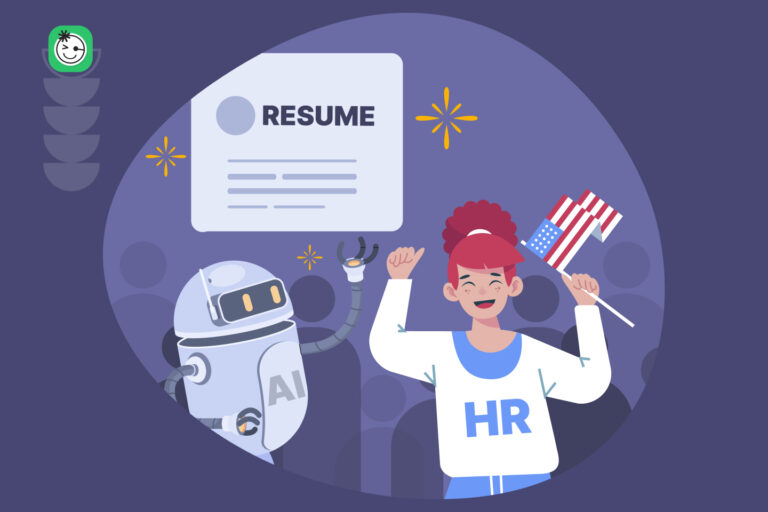How to Answer “Tell Me About Yourself” in 2025
What’s inside this article:
- Tell Me About Yourself Sample Answers
- Preparing Your Pitch for Different Scenarios
- Tell Me About Yourself Best Answers
- Avoiding Common Pitfalls: What Not to Do
- How to Structure Your Answer: Present, Past, Future
- Mastering Your Signature Delivery
- Final Summary: Your Story, Your Edge
The dreaded “Tell me about yourself” interview question – those six words have the power to strike fear into even the most seasoned job seeker’s heart. It’s an open-ended prompt that can lead you down a rambling path of oversharing or undersharing. Get it right, and you’ve made a great first impression while showcasing your top skills and achievements. Flub it, and you risk turning off the interviewer before the real questions even begin.
But have no fear! With some strategic preparation, you can nail this opening interview hurdle. The key is treating it not as an invitation for your life story, but as a chance to briefly summarize your most relevant qualifications for the role. Think of it as a high-impact movie trailer designed to excite the viewer (the interviewer) about the full-length feature (you as a candidate). With a punchy and compelling pitch, you’ll captivate their interest and lay the groundwork for a stellar interview.
In this guide, we’ll equip you with surefire tips and sample answers to craft a “Tell me about yourself” response that highlights your top assets while steering clear of common pitfalls. Get ready to make a powerful first impression that increases your chances of landing your dream job!

Tell Me About Yourself Sample Answers
While there’s no one-size-fits-all perfect response to “Tell me about yourself,” your answer should follow a general formula that positions you as an ideal candidate. That means hitting on your professional background, important achievements and skills, and explaining why you’re enthusiastic about this particular opportunity.
The samples below can serve as a helpful framework for crafting your own unique pitch during interviews. Just be sure to customize the details to align with your specific experience and the role you’re interviewing for.
| Position | What to tell |
|---|---|
| For an Entry-Level Role | “I recently graduated from Stanford University with a degree in Computer Science and a concentration in Machine Learning. Throughout my studies, I had the opportunity to intern at a few major tech companies like Google and Apple, where I collaborated on developing cutting-edge AI models for enterprise applications. I was drawn to this role at [Company] because of your reputation for innovative products powered by advanced AI/ML technologies. With my academic training and hands-on experience, I’m confident I can provide immediate value to your team while continuing to grow my expertise.” |
| For a Mid-Career Industry Transition | “For the past 8 years, I’ve worked as an award-winning digital marketer and social media strategist in the entertainment industry. I’ve overseen multi-million dollar advertising campaigns for major film studios like Disney and led the online presence for A-list celebrity talent. While I’ve thrived in this creative marketing space, I’m looking to transition my skills to the healthcare/biotech field – an industry where I can apply my expertise to inspire positive change and improve people’s lives on a deeper level. When I saw the opening for Head of Marketing at [Company] and your mission of developing groundbreaking therapies for chronic illnesses, I was immediately interested…” |
| For an Executive Leadership Position | “With over 15 years of experience leading high-growth technology companies, I’ve honed expertise in areas like strategic planning, operations management, team building, and product development. My most recent role was as VP of Product for a Series B cloud computing startup, where I spearheaded the launch of our flagship SaaS platform generating $25M in ARR. I’m drawn to [Company] because of your innovative approach to [XYZ technology] and the opportunity to apply my experience to scale the business during this pivotal growth stage. I thrive in fast-paced, entrepreneurial environments, and I’m passionate about building disruptive products that reshape industries…” |
The most memorable “Tell me about yourself” responses strike a balance between concise and meaty. Aim for around 60-90 seconds that cover your key selling points without veering into excessive rambling or one-word platitudes. With some careful preparation, you can deliver an impactful pitch that markets your talents in a compelling yet succinct way.
Preparing Your Pitch for Different Scenarios

While the fundamentals of an impressive “Tell me about yourself” response remain the same across interviews, there are nuances to consider based on the specific role, company, and industry you’re targeting. Tailoring your pitch’s content and delivery approach can help you make an even stronger impression that resonates with that particular opportunity.
For Creative/Marketing Roles
When interviewing for jobs requiring innovative thinking and persuasive communication skills—like creative agencies, marketing firms, or content roles—you have more leeway to infuse your pitch with punchy storytelling and dynamic flair. Use vivid language, concrete examples, and an animated speaking style to showcase the qualities that make you suited for these roles demanding imagination and influence.
For Technical/Engineering Positions
For deeply technical roles like coding, engineering or data science, your “Tell me about yourself” will likely be more sharply focused on enumerating specialized hard skills, tools, methodologies and quantifiable impacts you can bring to the table. While you’ll still want to integrate some high-level backstory for context, the meat of your response should zero in on proficiencies and problem-solving abilities pivotal for this line of work.
For Management/Leadership Opportunities
If you’re interviewing for senior leadership or executive roles, your elevator pitch should emphasize top-level achievements that demonstrate skills like strategic vision, team building, cross-functional collaboration and executing against long-term objectives. Highlighting concrete growth metrics, cultural transformations or key initiatives you’ve spearheaded can reinforce your preparedness to take the reins.
For Consulting/Client-Facing Roles
Standout pitches for client-advisory consulting roles should articulate your expertise in areas like project management, communication, diplomacy and ability to build trust-based relationships. Use your background to illustrate your capacity to understand a client’s nuanced business challenges and develop tailored solutions. You’ll want to come across as both technical skill and polished “client whisperer.”
For Mission-Driven Organizations
When pursuing opportunities with companies centered around an inspiring mission—nonprofits, social impact initiatives, values-focused industries like education or public service—your “Tell me about yourself” should convey an authentic passion for that larger vision and articulate how you can help drive that important work. Connecting personal motivations and aligning your skills to their aspirational goals can be incredibly powerful.
No two “Tell me about yourself” responses will be exactly alike because ultimately, you’re marketing a unique professional product—you. By making adjustments that home in on the qualities most vital for a given role, company and culture, you can ensure your impactful pitch directly resonates with the opportunity’s distinct needs and priorities.
Tell Me About Yourself Best Answers
Even if you’re caught off guard by the dreaded “Tell me about yourself” request during an interview, there are strategies for delivering a strong response on the fly. While it’s always advisable to prepare ahead of time, these tips can help you craft a compelling answer in the moment:
Focus on Your Professional Journey
The best impromptu “Tell me about yourself” pitches zero in on your core professional background and qualifications for the role. Don’t ramble about personal details or meander too far into the past – drive straight to the heart of your relevant work experience, key skills, and biggest achievements or impacts. Frame these highlights in a concise, punchy narrative hitting the major career milestones that make you an ideal fit.
Sprinkle In Relatable Personal Traits
While the focus should stay professional, you can briefly touch on a personal attribute or two that reinforces your alignment with the role and company’s culture. For example, if you’re applying for a startup gig, you could mention how your scrappy, entrepreneurial spirit has fueled past successes. Or for a creative agency position, you may highlight your curiosity and passion for innovative ideas. Just stick to concise personal insights that ladder back to your qualifications.
Express Authentic Enthusiasm About This Opportunity
A compelling elevator pitch isn’t just about what you’ve done – it should convey why you want this particular position. Do your research and find aspects of the company’s mission, culture, or initiatives that genuinely excite you. Then briefly touch on what draws you to this role and team. Your enthusiasm will shine through and reinforce your fit.
Focus On Achievements Over Responsibilities
Rather than listing job duties, zero in on 1-2 key achievements, wins, or impacts that exemplify the value you can provide. Quantify these as much as possible to make them more tangible and impressive. For example: “At Acme Corp, I led a team that optimized our supply chain processes, reducing operations costs by 25% while improving on-time deliveries to 98%.”
Aim for 60-90 Seconds
A strong impromptu pitch should clock in at roughly 1-1.5 minutes. This gives you enough time to articulate your relevant background and motivations without droning on too long. Practice keeping it concise yet impactful.
While developing a polished pitch ahead of time is ideal, these tips can help you get on your feet and deliver a compelling “Tell me about yourself” answer even in an unexpected situation. With the right mix of highlighting professional strengths and exhibiting enthusiasm, you can quickly market yourself as the right person for the job.
Avoiding Common Pitfalls: What Not to Do

Even with solid preparation, it’s easy to stumble into some response traps when tackling this open-ended interview prompt. Steering clear of these common mistakes will help ensure your “Tell me about yourself” answer makes an impactful, polished impression.
Don’t Recite Your Resume Verbatim
While you’ll definitely want to highlight key credentials from your work history, avoid simply regurgitating your entire resume line-by-line. Not only is this dry and uncreative, but it’s also a wasted opportunity to showcase your dynamic communication skills and personality. Treat this as a chance to bring your background to life in a refreshing, engaging way.
Instead, bring your experience to life. Use this question to highlight key transitions, accomplishments, and interests that aren’t obvious on paper. Show how your journey has shaped the way you think and work.
But Don’t Overshare Personal Details Either
On the flip side, be careful about delving too deeply into overly personal anecdotes or intimate details about your life story, relationships, or struggles. While adding a brief humanizing element can sometimes enhance your pitch, anything excessive or too private is inappropriate and irrelevant for a job interview context. Maintain a professional perspective at all times.
Instead, keep it professional with a hint of personality. A brief, relevant personal insight can enhance your answer, but keep the spotlight on your professional path, values, and goals.
Don’t Ramble Without a Narrative Arc
Winging it without a strategic framework usually results in a rambling, disjointed response that lacks impact and cohesion. There should be a clear beginning/middle/end structure to your “Tell me about yourself”—almost like telling an abridged personal-professional story about what led you to this role. Even if going off-script, stick to an overarching flow rather than just rapidly firing off data points.
Instead, use a framework like Present–Past–Future. A structured approach keeps your answer focused, builds a sense of narrative, and makes it easier to connect your past experience to your current aspirations.
Avoid Coming Off As Arrogant or Conceited
There’s a fine line between confidence and arrogance when discussing your abilities. Be sure to adopt a poised yet humbled tone that lets your accomplishments speak for themselves. Avoid excessive self-praise, name-dropping, or an elevated sense of entitlement just because of your background. Authenticity and grace will take you much further.
Instead, aim for confident humility. Share your achievements with clarity and pride, but allow your work to speak for itself. Focus on results and impact, not just titles or status.
Don’t Spend Too Much Time on Any One Particular Role
Unless pertaining to a very recent or highly pivotal position, avoid getting bogged down in granular details about any singular job experience for too long. Give a high-level overview of major roles and achievements, then circle back to elaborate on the specifics that are most relevant for this new opportunity you’re pursuing.
Instead, give a high-level overview, then zoom in where it counts. Touch briefly on each stage of your career, but expand only on the parts that directly relate to the position you’re pursuing.
The “Tell me about yourself” interview question is deceptively challenging, which is why interviewers often use it as an initial screening tool. By being aware of these common blunders, you can avoid costly mistakes and elevate your response with polish, poise and resonance. With purposeful preparation and delivery, you’ll be well on your way to acing this opening pitch.
How to Structure Your Answer: Present, Past, Future
There is no such thing as the “correct” answer to the “Tell me about yourself” question. But as we figured out all do’s and don’ts it is time to structure everything properly. A well-structured response makes all the difference. It helps you stay on track, hit key points, and build a compelling story the interviewer will remember.
One of the most reliable formats for doing this is the Present, Past, Future approach. It lets you tell a clear and concise story about your career while naturally leading into why you’re a great fit for the role.
| Part | What to Cover | Example | Tip |
|---|---|---|---|
| Present | Briefly describe your current role or situation. Focus on what you’re working on now and any recent achievements. | “I’m currently a product manager at a SaaS company, leading mobile development. I recently helped increase user retention by 20% through feature updates.” | Choose highlights that are relevant to the role you’re applying for. If you’re between jobs, mention current projects or learning efforts. |
| Past | Summarize how you got here. Mention previous roles or experiences that shaped your skills and career direction. | “Before this, I worked as a business analyst where I developed a strong foundation in data analysis and stakeholder collaboration.” | Focus on experiences that show growth or a clear path to your current position. You don’t need to list your full work history. |
| Future | Explain what you’re looking for next and why this opportunity excites you. Show how your goals align with the company’s mission or role requirements. | “Now I’m looking for a role where I can contribute to product strategy from an early stage. I’m especially drawn to your focus on user-centered design.” | Be specific about what excites you. Show you’re not just job-hunting but looking for a role that fits your interests and strengths. |
Why It Works
The Present, Past, Future structure is effective because it provides context, builds credibility, and ends with purpose. It helps you avoid rambling while giving your interviewer a clear narrative. Just as important, it shows that you are intentional about your career path and confident in the direction you’re heading.
Mastering Your Signature Delivery
Nailing the “Tell me about yourself” interview question is a true art form. It requires striking the perfect balance between being concise yet comprehensive, professional yet personable, and most importantly—prioritizing the details that reinforce you as an ideal candidate for that particular role.
Yes, it can feel daunting to summarize your entire professional identity into a 60-90 second elevator pitch on the spot. But with purposeful preparation and practice implementing the strategies outlined in this guide, you can turn this opening interview gauntlet into an opportunity to make a powerful and memorable first impression.
The core principle? Your “Tell me about yourself” response should serve as a high-impact teaser for your larger career story—one that compels the interviewer to want to learn more about you and how you can provide value to their team. By leading with a punchy overview of your greatest hits and relevant proficiencies, you immediately position yourself as a strong contender worthy of their consideration.
From there, sprinkling in humanizing personal traits and expressing genuine enthusiasm about this opportunity allows you to forge an authentic connection beyond just highlighting skills on a resume. You come across as a well-rounded professional they can envision being a cultural addition, not just someone checking off requirements.
Of course, the nuances of how you craft and deliver your signature pitch will vary based on factors like the role, company, and industry. But no matter the specifics, make sure you:
- Highlight 2-3 core strengths that align with the job
- Quantify achievements rather than just listing responsibilities
- Explain motivations for pursuing this opportunity
- Maintain a focused, cohesive narrative flow
- Avoid rambling, oversharing, or clichés
With the right mix of prepared yet natural delivery, you’ll be able to deftly navigate this make-or-break interview moment—setting yourself up to elaborate on those stellar qualifications throughout the rest of the conversation.
So go ahead and view “Tell me about yourself” not as a daunting intake question, but as your chance to be the well-rehearsed leading actor taking center stage. With a dynamic, compelling performance previewing the value you can deliver, you’ll have the interviewer saying “You’re hired!”
Final Summary: Your Story, Your Edge
“Tell me about yourself” isn’t just a warm-up — it’s your moment to lead the conversation with purpose. In this guide, we covered how to craft a strong, structured response using the Present–Past–Future framework, adapt your pitch to different roles, avoid common pitfalls, and highlight what truly sets you apart.
Whether you’re applying for a creative, technical, leadership, or mission-driven role, the key is the same: focus on what matters most, be clear about your value, and express genuine enthusiasm for the opportunity.
Just like refining your resume score, practicing and improving your interview pitch is an essential part of standing out. With the right preparation, this opening question becomes your best chance to make a memorable, confident first impression.
You’ve got the tools — now go tell your story.








